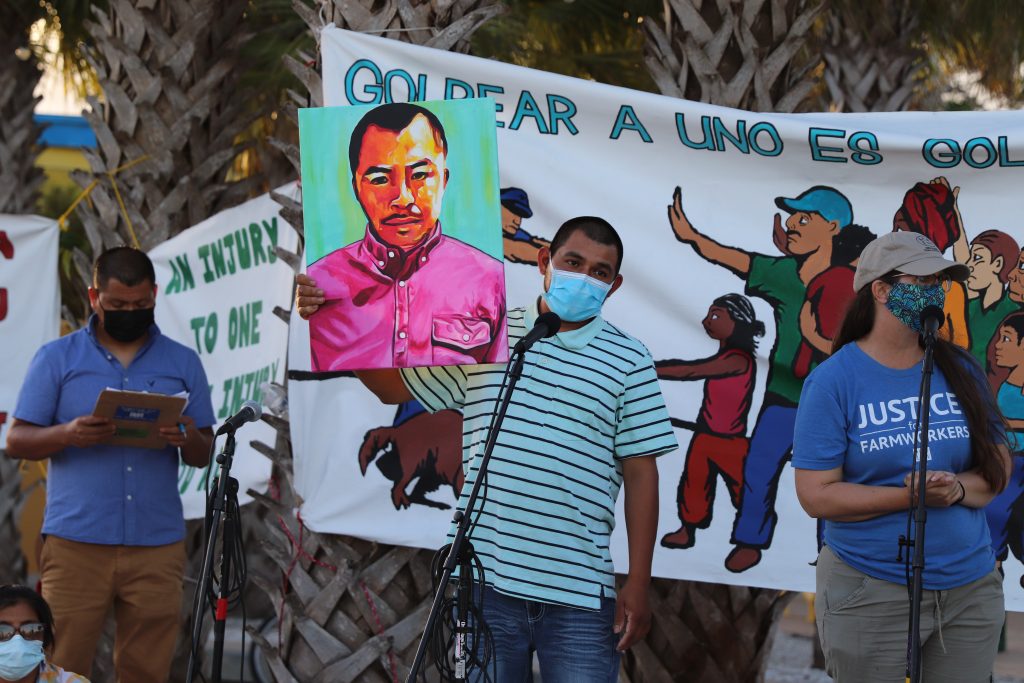
Rolling Stone Magazine: “[Nicolas’] shooting seemed to sit at the nexus of problems with policing that cities across the country have been grappling with for the past year: allegations of excessive force, the vulnerability of marginalized communities to police abuse, and a paucity of mental health services, which leads to yet more violent encounters with officers…
While 30 percent of Americans felt compelled to seek therapy during the pandemic, Immokalee residents were left with few options but to cope as Morales did — head down, trudging forward to provide for their families…
“We know that if they would’ve had an appropriate response to someone in a mental health crisis,” says another senior CIW staffer and farmworker leader, Nely Rodriguez, “there wouldn’t be a young boy who’s now an orphan.”
Last Friday, Rolling Stone Magazine, one of the country’s most celebrated culture and politics monthly magazines for the past 50+ years, published a feature-length article about the life – and the tragic death – of Nicolas Morales, the Immokalee farmworker and single father who was shot and killed last September by the Collier County Sheriff’s Office. The article, titled “Florida Farmworkers, Rocked by Covid and a Fatal Police Shooting, Are Demanding Justice”, is a solemn, heart-breaking, and detailed account of the night Nicolas died, the ripple effects his death have had within his family and his community, and the ongoing calls for justice from Immokalee.
Here below are some excerpts from the piece, though the full-length article is well worth a read, and we encourage to you share it widely:
Florida Farmworkers, Rocked by Covid and a Fatal Police Shooting, Are Demanding Justice
The death of Nicolas Morales Besanilla left his son orphaned and a lot of questions for a community that has already spent years fighting to be seen and heard
In the early hours of a September morning last year, Nicolas Morales Besanilla, a 37-year-old farmworker, woke his 12-year-old son and namesake, Nicolas Jr., from sleep in their home in Immokalee, Florida. He told his son he was seeing “spirits and creatures,” and shortly thereafter climbed through a back window to seek help.
It was highly unusual behavior for Morales; family and friends say they were unaware of him having any such break with reality before. That morning before he left for work, Morales had complained of a fever and headache to his neighbor, Nicolas Jr.’s longtime babysitter. He speculated whether he could have the coronavirus and asked if she had any pain reliever — she didn’t. Even still, Morales carried out his daily morning routine: Wake at 4 a.m., prepare his son’s lunch for school, take the sleepy child to the babysitter’s and walk roughly two miles to work. Immokalee is the “tomato capital of the United States,” and Morales, who moved to Florida from Hidalgo, Mexico, some 10 years earlier, split his time between working in the fields and in the packing houses where the harvest was prepared for distribution.
“You’d better take care of yourself, Nicolas,” the neighbor chided him before he left that morning. “If not for you, then for your son!”
It had been a difficult few years for Morales. He lost his wife, Olga, to diabetes-related complications and a stroke from which she never recovered in 2015. In the final months of her life, she was bound to a wheelchair, and her last weeks were spent on life support. She had eight children — seven from previous relationships who are now adults, and Nicolas Jr. with Morales. The family’s last holiday together was spent in a hospital cafeteria.
Friends and neighbors say Morales was destroyed by Olga’s death. Prior to her passing, she had also worked the fields and took odd jobs. It was tough to make ends meet, but Morales was devoted to Nicolas Jr. “All I can do is keep working hard for my son,” he’d repeat like a refrain to his neighbor in particularly trying moments.
After work that day, around 5:30 p.m., he picked up Nicolas Jr. from his babysitter’s, reminding her that he would receive his paycheck on Friday and would be able to pay her then. “I’m an honest person,” he said. It would be the last time she would see him alive…
… When the sun came up on the morning Morales had been killed, community members noted there was no police tape or officials milling around the scene. The only sign that a tragic event occurred just hours earlier was a small vigil laid in the grass near where he was shot, where it has remained ever since.
Even still, word of the shooting spread throughout the community, quickly reaching staff members of the Coalition of Immokalee Workers (CIW), a community-led human-rights organization. For decades, the CIW has been successfully leading efforts to improve conditions for the farmworkers that call Immokalee home… and [Nicolas’] shooting seemed to sit at the nexus of problems with policing that cities across the country have been grappling with for the past year: allegations of excessive force, the vulnerability of marginalized communities to police abuse, and a paucity of mental health services, which leads to yet more violent encounters with officers…
… Collier County stretches the southern Gulf coast of Florida, just above Everglades National Park, and is known to tourists as “Paradise Coast.” Within its jurisdiction are wealthy cities like Naples – the 15th wealthiest zip code per capita in the nation — lush with PGA-anointed golf courses and the resort destinations of Marco Island, where thousands of snowbirds flock each year for its white sandy beaches. Inland, about 40 miles, sits Immokalee, home to 26,500 farmworkers, mostly Mexican, Haitian and Guatemalan migrants who work the fields of tomatoes and citrus fruit that get shipped and sold across the country to corporate chains like Walmart, Publix and a myriad of fast food restaurants.
The town has served as one of the country’s foremost farming fulcrums since the 1940s, and first entered mainstream conversation via Edward R. Murrow’s Peabody Award-winning exposé Harvest of Shame. The documentary was one of the first examinations of the plight of migrant workers in the U.S. and shocked the American public when it aired the day after Thanksgiving, 1960. It followed farm workers who earned just $1 a day, working in the fields from 6 a.m. to 4 p.m., leaving them unable to afford basic necessities for their families and suffering conditions like cramped and unsanitary housing and a lack of hot water for bathing.
“We used to own our slaves; now we just rent them,” a local farm owner told the camera.
While conditions and wages grew slightly better, the same issues lingered and mutated in the decades that followed. Across Florida, wage theft and sexual harassment from farm owners became all the more common until 1993, when farm workers formed the CIW in response. The CIW headquarters, a modest, one-story surrounded by roaming roosters, is equal parts community meeting-place, radio station, and co-op that offers food and other necessities at fair prices to all who enter…
…After pressuring powerful corporations like McDonalds to lean on growers to improve conditions, the CIW was able to start the Fair Food Program. Heralded by The New York Times as one of “the best workplace-monitoring systems in the country,” it’s an enforceable agreement between corporate buyers, produce growers and the CIW that provides workers with better wages and working conditions. Since its inception in Florida, the Fair Food Program has grown into a multi-state, multi-crop program, covering tens of thousands of workers on farms up and down the East Coast and establishing a replicable model that has served as the basis for addressing abuse everywhere from the textile industry in Lesotho to the U.S. entertainment industry.
Even still, many farmworkers have remained entrenched in poverty, with next-to-no access to government services — an issue that was shown in stark relief by the Covid-19 pandemic… While 30 percent of Americans felt compelled to seek therapy during the pandemic, Immokalee residents were left with few options but to cope as Morales did — head down, trudging forward to provide for their families. With the long work days, six or seven days a week, physically dangerous work, and economic insecurity, farmworker families are rarely able to access medical care, either in an emergency or to manage long-term health issues. “We have modest basic services here, mostly through the local federally qualified health clinic and by a few private doctors, but have no major hospital closer than an hour away,” says Gonzalo…
… Seven months after the shooting, Jesse Andrade, Morales’ step-son, sits on a dock on Lake Trafford in a particularly rural part of Immokalee and remembers the day the dash-cam footage was published. Andrade had been at work and hadn’t looked at his phone for several hours. At the end of his shift, he found it inundated with text messages and phone calls asking if he’d seen the video yet.
Andrade, who lives in Immokalee and has a family of his own, grew up with Morales alongside three of his siblings. “It takes a real man to raise another person’s children,” he says in a low voice, his eyes concealed by dark sunglasses. When he watched the video of his step-father’s death, he immediately broke down at the thought of Nicolas Jr., he says, and what his life might become without both of his parents. “The first thing that came to my mind was my little brother because now he’s basically on his own.”…
…The CIW and the Immokalee community have asked the Collier County Sheriff’s Office for the creation of a crisis response team, trained professionals who can accompany police in responding to cases like Morales,’ in addition to an independent, Immokalee-based review board that would get a say in whether or not excessive force was used or justified in any given case.
Major cities across the country have begun implementing such practices. Portland, New York City, Denver and Oakland have all recently piloted programs that train dispatchers to identify calls potentially involving a mental health crisis, and either replace police or pair them with mental health professionals and crisis intervention specialists. Results thus far have been deemed successful with significantly reduced arrests and violence. In April, it was reported that at least 14 other cities around the country were interested in pursuing similar practices.
“We know that if they would’ve had an appropriate response to someone in a mental health crisis,” says another senior CIW staffer and farmworker leader, Nely Rodriguez, “there wouldn’t be a young boy who’s now an orphan.”

